In this article:
Creatinine comes from creatine, which is a liver-produced compound that is used up by the muscles for energy. The unused creatine, in turn, is converted into creatinine. This chemical waste product found in the blood is a by-product of muscle metabolism or routine muscle contractions.
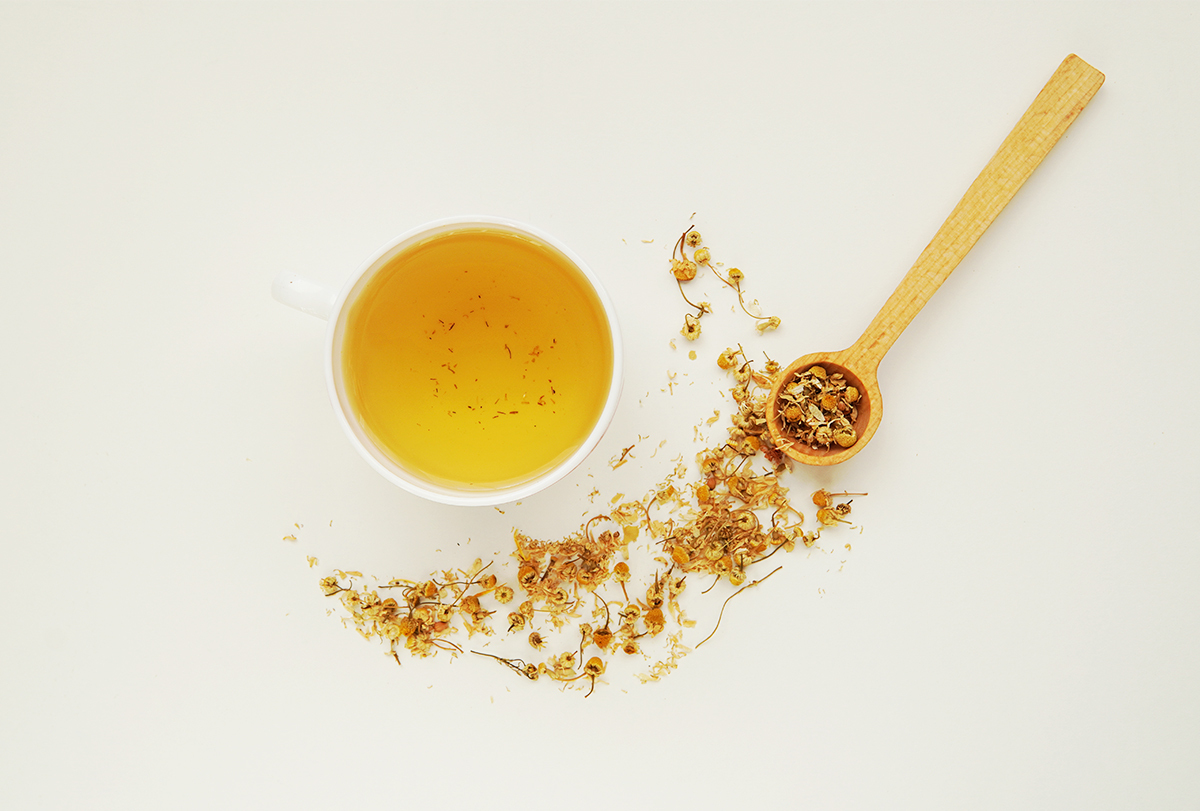
Creatinine is expelled from the body via kidneys, which filter the blood and remove the creatinine to be passed out as urine. The creatinine level of a person is reflective of two factors:
- Kidney function
- Muscle mass
Persistently high levels of creatinine indicate that the kidneys may not be functioning properly due to kidney damage or disease. Men tend to have higher levels of creatinine than women because of the comparative excess of body muscle.
The normal range of creatinine in the blood is:
- 0.6 to 1.2 mg/dL (or 53 to 106 mcmol/L) for males
- 0.5 to 1.1 mg/dL (or 44 to 97 mcmol/L) for females
The values may vary slightly depending on different laboratories and their techniques.
Natural Treatment Options for High Creatinine Levels
Here are some home remedies to reduce high creatinine levels.
1. Drink chamomile tea daily
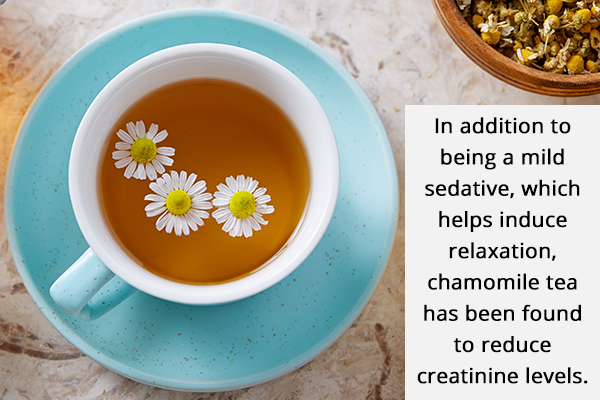
In addition to being a mild sedative, which helps induce relaxation, chamomile tea has been found to reduce creatinine levels. (1)
A 2012 study published in the Saudi Journal of Kidney Disease and Transplantation reports that the coadministration of Matricaria chamomilla (German Chamomile) with cisplatin had a protective effect on kidney functioning and attenuated the toxic effects of cisplatin in the kidneys by decreasing the levels of urea, creatinine, etc. (2)
How to use:
- Put 2 or 3 teaspoons of dried chamomile flowers in 1 cup of hot water.
- Let it steep for 3 to 5 minutes.
- Strain the tea and drink it.
- Drink a few cups of this chamomile tea daily.
2. Sip on a cup of stinging nettle tea
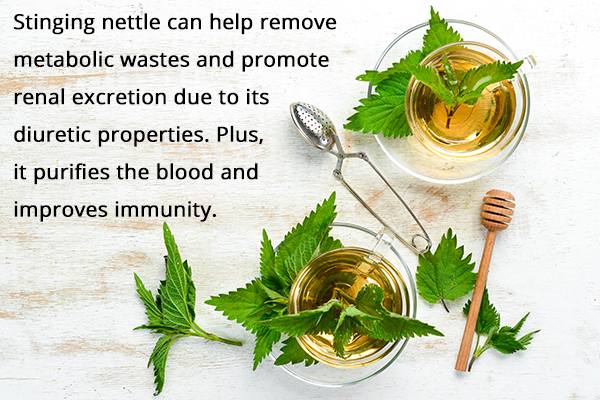
Stinging nettle can help remove metabolic wastes and promote renal excretion due to its diuretic properties. Plus, it purifies the blood and improves immunity. (3)(4)
A 2015 study published in the Asian Pacific Journal of Tropical Biomedicine found that nettle extract protected rabbits from alteration in the level of blood urea nitrogen and serum creatinine when given after induction of gentamicin nephrotoxicity. (5)
How to use:
- Add 2 to 3 teaspoons of dried nettle leaves to 1 cup of hot water.
- Let it steep for 10 minutes.
- Strain and drink it.
- Drink this nettle tea once or twice daily.
Note: This remedy should be used in moderation, as higher doses may be toxic. This remedy can interfere with blood-thinning, high blood pressure, diuretic, and diabetic medications. Consult your doctor before using this remedy. Also, you must refrain from consuming stinging nettle tea if you are pregnant or breast-feeding.
3. Try dandelion root tea
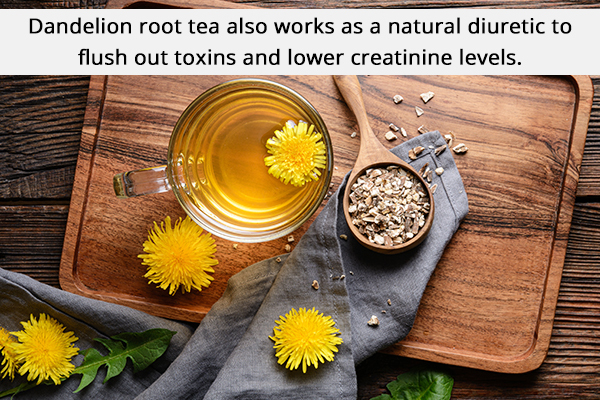
Dandelion root tea also works as a natural diuretic to flush out toxins and lower creatinine levels. It also helps improve kidney function and relieve edema or swelling due to water retention. (6)
How to use:
- Put 1 tablespoon of dried dandelion root powder in 1 cup of hot water.
- Allow it to steep for about 10 minutes.
- Strain and drink it.
- Drink this tea two or three times daily for a few days or weeks.
Note: Dandelion may interact with diabetes and high blood pressure medications, and therefore, your doctor’s counsel is necessary before incorporating it into your diet.
4. Add cinnamon to your diet
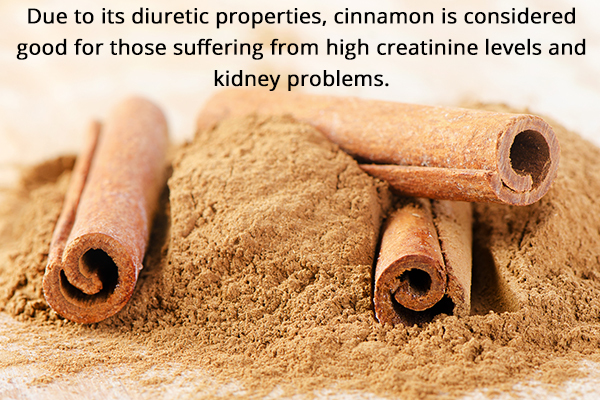
Due to its diuretic properties, cinnamon is considered good for those suffering from high creatinine levels and kidney problems. It helps increase kidney output and promotes renal filtration ability. It also helps regulate blood sugar levels, thus preventing further renal damage.
A 2014 study published in Toxicology Report found that cinnamons aqueous extract pretreatment 2 hours before bisphenol A (BPA) or octyl phenol (OP) administration, ameliorated their nephrotoxic effects as indicated by significant reductions in serum urea and creatinine levels in comparison with the levels of the BPA- and OP-treated groups, respectively. (7)
Incorporate cinnamon in your diet by adding it to warm beverages, smoothies, baked goods, cereals, and other foods.
Note: Do not take this herb in excess or it may lead to liver and kidney damage. Although there is no established dosage yet, the generally recommended intake quantity is ½ to 1 teaspoon of cinnamon a day.
5. Include Siberian ginseng in your diet

Siberian ginseng, which contains eleutheroside compounds, is mostly used as a health supplement for its energy-boosting properties. It is also an effective remedy to get rid of excess creatinine because it revitalizes the kidneys and promotes renal circulation. Plus, its anti-fatigue and anti-stress benefits are added boons.
A 2012 study published in the Journal of Ginseng Research reports that Siberian ginseng significantly decreased the levels of both urea nitrogen and creatinine in the serum, indicating an improvement of renal function. Additionally, it significantly increased the urinary excretion of both urea and creatinine. (8)
The general recommended dosage for this herb is 300 to 600 mg per day. For proper dosage and suitability for your condition, consult your doctor. It can also be taken with cinnamon.
Note: Do not confuse Siberian ginseng with other types of ginseng, especially Asian ginseng, which has an antidiuretic effect. Seek your doctor’s advice before taking Siberian ginseng because it may interfere with a variety of prescription drugs.
6. Give astragalus tea a go
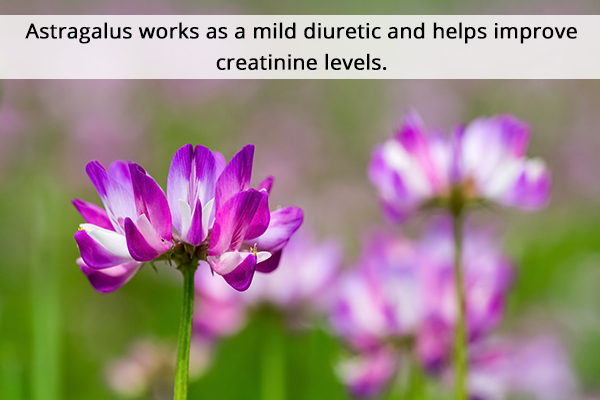
Astragalus is a traditional Chinese herbal medicine that helps slow the progression of chronic kidney disease. It works as a mild diuretic and helps improve creatinine levels. It contains a diuretic compound called asparagine, which helps eliminate fluid through the kidneys. This herb also strengthens the metabolism and improves digestion. (9)
A 2012 study published in the Hong Kong Journal of Nephrology found that Astragalus membranaceus improved creatinine clearance and can delay the initiation of renal replacement therapy by at least one year in patients with progressive chronic kidney disease. (10)
How to use:
- Boil a handful of dried astragalus root slices in 1 quart of water for 30 minutes.
- Strain and drink the tea.
- Drink this tea daily between meals.
Note: Those who have autoimmune diseases should consult a doctor before taking this herb as it may stimulate the immune system. Also, pregnant women should abstain from this remedy as astragalus can be toxic to the mother and the fetus.
7. Reap the benefits of corn silk tea
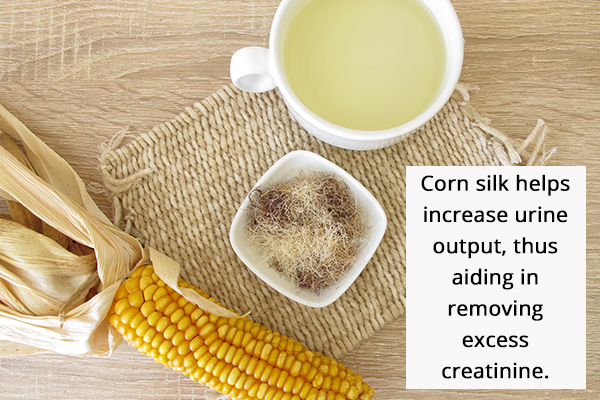
Corn silk acts as a natural diuretic and anti-inflammatory agent. It helps increase urine output, thus aiding in removing excess creatinine. It also reduces edema and lowers high blood pressure. (11)
A 2012 study published in Molecules found that the consumption of corn silk methanol extract in combination with gentamicin treatment greatly reduced serum creatinine levels and thereby mitigated the gentamicin-induced nephrotoxicity or adverse functional or structural changes in the kidney. (12)
How to use:
- Put 2 teaspoons of dried corn silk in a cup.
- Pour boiling water over it.
- Cover and allow it to steep for 10 to 15 minutes.
- Strain and drink this tea three times a day.
Note: Do not use this remedy if you are allergic to corn or have a history of liver or kidney disease. It may also decrease blood sugar and potassium levels. Pregnant women should restrain from using excess amount of this tea as corn silk can stimulate the uterus and can lead to miscarriage.
8. Consuming sage tea may help
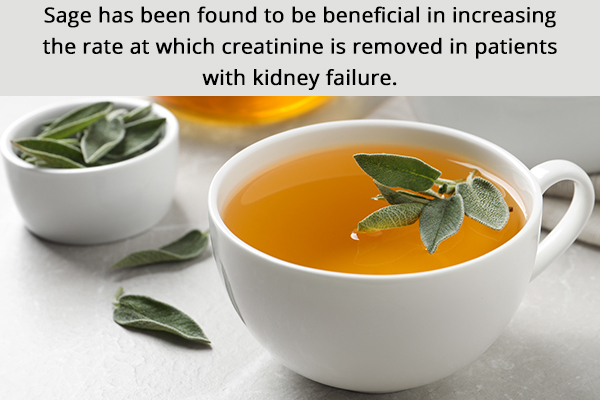
Salvia officinalis, commonly known as sage, has been found to be beneficial in increasing the rate at which creatinine is removed in patients with kidney failure. It helps filter out and eliminate creatinine from the body. It also helps improve renal circulation. Apart from that sage has a lot of health benefits, nutrients and culinary uses.
A 2018 study published in Archives of Physiology and Biochemistry reports that sage treatment helped offset the vanadium-induced renal damage and restored control over plasma levels of urea, uric acid, creatinine, and blood urea nitrogen levels in Wistar rat models. This protective effect is due to the presence of beneficial compounds such as β-caryophyllene, limonene, carvacrol, caryophyllene, borneol, α-pinene, and α-thujene in sage extracts. (13)
Another 2017 study published in the International Journal of Prevention and Treatment found that S. officinalis and Ruta graveolens ethanolic leaf extracts significantly improved the elevated levels of creatinine, urea, and uric acid towards the normal levels in chlorpyrifos and methomyl administered rats. (14)
- Add 1 teaspoon of dried sage or 10 fresh leaves to 1 cup of hot water.
- Let it steep for 5 to 10 minutes.
- Strain and drink this tea one to three times a day.
Note: Avoid this remedy if you are pregnant or diabetic. Also if you have a history of liver or kidney disease.
9. Chinese rhubarb tea is worth a try
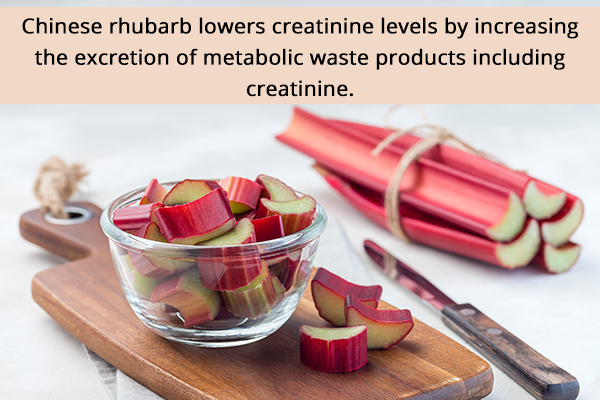
Chinese rhubarb promotes intestinal detoxification and increases urine output. It lowers creatinine levels by increasing the excretion of metabolic waste products including creatinine. Thus, this herb is widely recognized for its properties that help improve kidney function.
A 2009 study published in the Journal of Ethnopharmacology found that rhubarb showed a positive effect on relieving uremic symptoms, lowering serum creatinine, improving hemoglobin levels, and adjusting disturbance of lipid metabolism in 1322 patients with chronic renal disease. (15)
How to use:
- Chop a stalk of Chinese rhubarb.
- Boil it in 1 cup of water.
- Strain and drink it twice daily for up to a week.
Note: Do not take this herb if you have a history of kidney stones.
Preventing High Creatinine

- Refrain from excessive vigorous exercise as it entails increased muscle metabolism, which leads to the breakdown of creatine into creatinine and thereby result in elevated levels of creatinine.
- Abstain from taking creatine-based supplements and vanadium.
- Cut back on your protein intake as excessive protein intake can raise creatinine levels of otherwise healthy individuals and further increase the levels of those already suffering from it. You can do this by avoiding dietary sources of creatine, such as red meat and dairy products.
- Up the intake of fiber by consuming more vegetables, fruits, legumes, and whole grains.
- Dehydration and inadequate fluid intake are often the most common reasons creatinine is elevated; it is therefore imperative to drink optimal amounts of liquid regularly. You can even diversify your fluid consumption by incorporating more herbal tea and green tea in your diet or by adding a slice of lemon or cucumber to your water, making it more flavorsome. Along with this, limit your caffeine intake as this can cause dehydration.
- Getting enough sleep is essential for your kidneys to function properly, which in turn helps the body to rid itself of excess creatinine.
- Limit your sodium intake by avoiding salty, packaged, and processed food, all of which lead to high blood pressure and fluid retention in the body.
What Causes a Rise in Creatinine Level?
Factors that contribute to high creatinine levels include the following:
- Dehydration or inadequate water intake
- Medications such as ACE inhibitors (16)
- NSAIDs such as aspirin and ibuprofen (17)
- Chemotherapy drugs and others
- Strenuous exercise
- Chronic diseases such as diabetes and high blood pressure (18)
- Thyroid disorders
- Kidney dysfunction, whether acute, chronic, or congenital
- Excessive blood loss (19)
- Muscle building
- Using the dietary supplement creatine
- Eating large amounts of protein such as meat
- Low blood pressure
- Other chronic medical conditions such as lupus, gout, muscular dystrophy, and rhabdomyolysis
Symptoms of High Creatinine
Some common symptoms of high creatinine are as follows:
- Digestive problems such as nausea, vomiting, and poor appetite
- Fatigue
- Urinary changes such as frequent night urination, decreased urine output, and dark-colored urine
- Edema
- Itchy skin
- Shortness of breath
When to See a Doctor
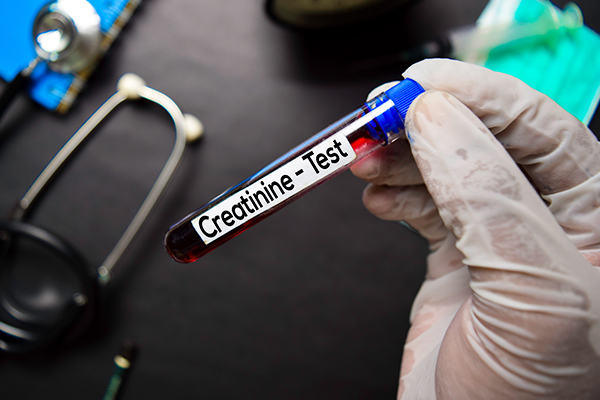
High levels of creatinine for a prolonged period can escalate to uremia, which is a life-threatening disease, it is imperative that you seek your doctor’s counsel. A doctor’s expertise is essential for figuring out the underlying cause and the remedial course of action for elevated creatinine levels.
A creatinine blood test is usually the first step that a doctor orders to evaluate if kidney disease is suspected. The following symptoms are its most common giveaway:
- Exhaustion
- Disrupted sleep
- Little to no appetite
- Swollen face, wrists, ankles, or abdomen
- Pain in the lower back, around the kidney area
- High blood pressure
- Nausea and vomiting
- Alterations in urine frequency and output
If you are taking aminoglycoside medications, such as gentamicin, you are susceptible to kidney damage. In that case, you must work closely with your doctor to keep tabs on your creatinine levels by way of regular creatinine blood tests. In addition, you can try some home remedies and dietary tips to help manage the problem.
Drinking plenty of water, for instance, is highly recommended when dealing with this problem. Also, there are some herbs that act as natural diuretics and thus help provide some relief. You can follow one or more of these herbal remedies daily for a few weeks or until your creatinine levels are reduced.
Note: It is important to consult a healthcare professional before taking these herbs or their combinations because they may interfere with certain prescription drugs or may not be suitable for some cases. Some of these remedies may also not be suitable for those with a history of kidney stones or other pre-existing conditions.
Additional Tips
- Replace your regular tea, coffee, or sodas with herbal tea, which has low or no caffeine.
- Steer clear of high-arginine foods such as seafood, chocolate, gelatin, beer, soybeans, peanuts, pumpkin seeds, sesame seeds, and other nuts and seeds because they tend to increase the liver’s production of creatine.
- Reduce minerals such as sodium, potassium, and phosphorus in your diet.
- Include more carrots, cucumbers, garlic, onion, and foods rich in omega-3 fatty acids in your diet.
- Was this article helpful?
- YES, THANKS!NOT REALLY


